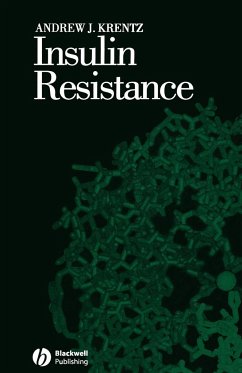Insulin resistance, defined as a reduced biological action ofinsulin, has emerged as a major factor in the development andprogression of a number of common non-communicable diseases in man.The role of insulin resistance in the aetiology of type 2 diabetesis particularly well-established. However, insulin resistance hasalso come to be regarded as a key component of a broader syndromeof common metabolic defects that conspire to increase the risk ofatherosclerotic coronary heart disease. The ramifications ofinsulin resistance now embrace many different medical specialties.
The objective of this book is to summarize the current state ofknowledge about insulin resistance. Section 1 (Pathophysiology ofInsulin Resistance) considers the development of current conceptsof insulin resistance. This is followed by a critical review oftechniques for the assessment of insulin action in humans. Thesection concludes with an outline of current hypotheses concerningthe molecular defects responsible for insulin resistance. Section 2(Insulin Resistance in Clinical Medicine) broadens the discussionto include physiological and pathological conditions with whichinsulin resistance is associated; the effects of drug treatment oninsulin sensitivity are also considered. Section 3 (Management ofInsulin Resistance and Associated Conditions) focuses on theavoidance and treatment of insulin resistance in its clinicalmanifestations. A discussion of the potential benefits ofnon-pharmacological measures prefaces a review of the range ofdrugs used in the treatment of type 2 diabetes and relateddisorders. References are confined to key articles at the end ofeach section.
Improved nutrition allied to increased levels of physical exerciseare of crucial importance in the battle to stem the increasingincidence and prevalence of insulin resistance; however,translation of such advice into action has proved difficult inpractice. Thus, other approaches have been explored. Recent yearshave witnessed considerable progress in the pharmacologicalmanagement of insulin resistance. In particular, thethiazolidinediones (and other insulin-sensitizing drugs) appear toprovide a more specific assault on insulin-resistance. Clinicalexperience with these agents remains relatively limited and serioushepatotoxicity has clouded the first agent in this class -troglitazone. With its introduction into the USA in 1995 and drivenby the publication of the United Kingdom Prospective DiabetesStudy, metformin has enjoyed a renaissance. This well-establishedagent is finding application for new clinical indications. Inparallel, the development of anti-obesity drugs continuesapace.
The molecular and genetic mechanisms underlying some forms ofinsulin resistance are being revealed.
Original intellectual concepts such as the fetal origins hypothesisare challenging traditional views about the aetiology of insulinresistance and its clinical sequelae. These exciting scientificadvances notwithstanding, the evolving global epidemic of obesityand type 2 diabetes represents an enormous public health challenge.Now more than ever, research must focus on identifying solutionsthat are applicable on the level of entire populations. Bydefinition, these must also be practical and cost-effective.
Hinweis: Dieser Artikel kann nur an eine deutsche Lieferadresse ausgeliefert werden.
The objective of this book is to summarize the current state ofknowledge about insulin resistance. Section 1 (Pathophysiology ofInsulin Resistance) considers the development of current conceptsof insulin resistance. This is followed by a critical review oftechniques for the assessment of insulin action in humans. Thesection concludes with an outline of current hypotheses concerningthe molecular defects responsible for insulin resistance. Section 2(Insulin Resistance in Clinical Medicine) broadens the discussionto include physiological and pathological conditions with whichinsulin resistance is associated; the effects of drug treatment oninsulin sensitivity are also considered. Section 3 (Management ofInsulin Resistance and Associated Conditions) focuses on theavoidance and treatment of insulin resistance in its clinicalmanifestations. A discussion of the potential benefits ofnon-pharmacological measures prefaces a review of the range ofdrugs used in the treatment of type 2 diabetes and relateddisorders. References are confined to key articles at the end ofeach section.
Improved nutrition allied to increased levels of physical exerciseare of crucial importance in the battle to stem the increasingincidence and prevalence of insulin resistance; however,translation of such advice into action has proved difficult inpractice. Thus, other approaches have been explored. Recent yearshave witnessed considerable progress in the pharmacologicalmanagement of insulin resistance. In particular, thethiazolidinediones (and other insulin-sensitizing drugs) appear toprovide a more specific assault on insulin-resistance. Clinicalexperience with these agents remains relatively limited and serioushepatotoxicity has clouded the first agent in this class -troglitazone. With its introduction into the USA in 1995 and drivenby the publication of the United Kingdom Prospective DiabetesStudy, metformin has enjoyed a renaissance. This well-establishedagent is finding application for new clinical indications. Inparallel, the development of anti-obesity drugs continuesapace.
The molecular and genetic mechanisms underlying some forms ofinsulin resistance are being revealed.
Original intellectual concepts such as the fetal origins hypothesisare challenging traditional views about the aetiology of insulinresistance and its clinical sequelae. These exciting scientificadvances notwithstanding, the evolving global epidemic of obesityand type 2 diabetes represents an enormous public health challenge.Now more than ever, research must focus on identifying solutionsthat are applicable on the level of entire populations. Bydefinition, these must also be practical and cost-effective.
Hinweis: Dieser Artikel kann nur an eine deutsche Lieferadresse ausgeliefert werden.








